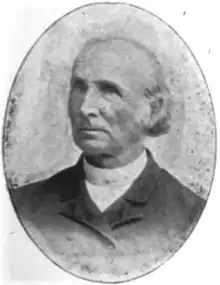Evangelical Lutheran Synod of Iowa
The Evangelical Lutheran Synod of Iowa and Other States, commonly known as the Iowa Synod, was founded on August 24, 1854, at St. Sebald in Clayton County, Iowa. It adopted a constitution and its name (German: Die deutsche evangelishe lutheranish Synode von Iowa), in 1864.[1] The synod was the result of disagreements, in Saginaw, Michigan, against the Missouri Synod that had arisen with some of the pastors sent to America by Johann Konrad Wilhelm Löhe . Some of these pastors joined the Missouri Synod, while pastors Georg M. Grossmann and Johannes Deindoerfer and a small group moved to Iowa.[2]
| Evangelical Lutheran Synod of Iowa | |
|---|---|
| Abbreviation | Iowa Synod |
| Classification | Protestant |
| Orientation | Lutheran |
| Theology | Confessional Lutheran |
| Structure | National synod, middle level districts, and local congregations |
| Associations | National Lutheran Council |
| Region | United States |
| Headquarters | Dubuque, Iowa |
| Founder | Georg M. Grossmann |
| Origin | August 24, 1854 St. Sebald, Iowa |
| Absorbed | First Evangelical Lutheran Synod of Texas (1896) |
| Merged into | American Lutheran Church (1930) |
| Congregations | 932 (1929) |
| Members | 150,683 (1929) |
| Ministers | 637 (1929) |

Most of the congregations of the First Evangelical Lutheran Synod of Texas joined the Iowa Synod as its Texas District in 1896.[3] In 1930, the Iowa Synod merged with the Ohio Synod and the Buffalo Synod to form the American Lutheran Church (ALC).[4] The latter body, after further mergers, became part of the Evangelical Lutheran Church in America in 1988.
In 1929, just before its merger into the ALC, the Iowa Synod had 637 pastors, 932 congregations, and 150,683 members.[5]
Notes
- Neve (1816), p. 383.
- Neve (1816), pp. 362-384.
- Christian Cyclopedia (2000), "United Lutheran Church in America, The, Synods of".
- Christian Cyclopedia (2000), "Iowa and Other States, Evangelical Lutheran Synod of".
- "Iowa Synod". American Denomination Profiles. Association of Religion Data Archives. Retrieved October 30, 2015.
References
- Lueker, Erwin L.; Poellot, Luther; Jackson, Paul, eds. (2000). "Iowa and Other States, Evangelical Lutheran Synod of". Christian Cyclopedia (Online ed.). St. Louis: Concordia Publishing House. Retrieved December 18, 2020.
- Neve, J. L. (1916). A Brief History of the Lutheran Church in America (Second Revised and Enlarged ed.). Burlington, Iowa: The German Literary Board. Retrieved October 30, 2015.